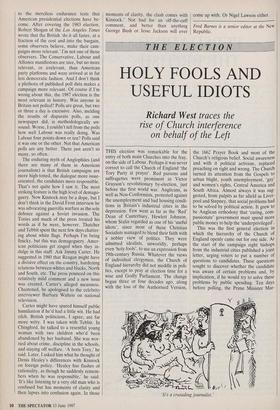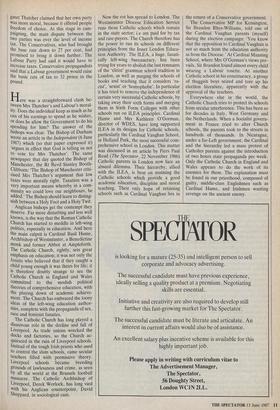THE ELECTION
HOLY FOOLS AND USEFUL IDIOTS
Richard West traces the
rise of Church interference on behalf of the Left
THIS election was remarkable for the entry of both main Churches into the fray, on the side of Labour. Perhaps it was never correct to call the Church of England 'the Tory Party at prayer'. Red parsons and suffragettes were prominent in Victor Grayson's revolutionary by-election, just before the first world war. Anglicans, as well as Non-Conformists, protested against the unemployment and bad housing condi- tions in Britain's industrial cities in the depression. Few went as far as the 'Red' Dean of Canterbury, Hewlett Johnson, whom Stalin regarded as one of his 'useful idiots', since most of these Christian Socialists managed to blend their faith with a nobler view of politics. They were admitted idealists, unworldly, perhaps even 'holy fools', to use an expression from 19th-century Russia. Whatever the views of individual clergymen, the Church of England hierarchy did not meddle in poli- tics, except to pray at election time for a wise and Godly Parliament. The change began three or four decades ago, along with the loss of the Authorised Version,
the 1662 Prayer Book and most of the Church's religious belief. Social awareness and with it political activism, replaced preaching on right and wrong. The Church turned its attention from the Gospels to urban blight, youth unemployment, 'gay' and women's rights, Central America and South Africa. Almost always it was sug- gested, from pulpits as far afield as Liver- pool and Stepney, that social problems had to be solved by political action. It grew to be Anglican orthodoxy that 'caring, com- passionate' government must spend more public money to help the 'underprivileged'.
This was the first general election in which the hierarchy of the Church of England openly came out for one side. At the start of the campaign eight bishops from the industrial cities published a joint letter, urging voters to put a number of questions to candidates. These questions sought to discover whether the candidate was aware of certain problems and, by implication, if he would try to solve these problems by public spending. Ten days before polling, the Prime Minister Mar- `It's a crusading journalist.'
garet Thatcher claimed that her own party was more moral, because it offered people freedom of choice. At this stage in cam- paigning, the main dispute between the two parties was over the level of income tax. The Conservatives, who had brought the base rate down to 27 per cent, had Promised to bring it down further. The Labour Party had said it would have to increase taxes. Conservative propagandists said that a Labour government would raise the basic rate of tax to 32 pence in the pound.
Here was a straightforward clash be- tween Mrs Thatcher's and Labour's moral- ity. Does the individual keep as much as he can of his earnings to spend as he wishes, or does he allow the Government to do his spending for him? The answer of the bishops was clear. The Bishop of Durham wrote an article in the independent (6 June 1987) which (so that paper expressed it) `argues in effect that God is telling us not to vote for Mrs Thatcher'. The same newspaper that day quoted the Bishop of Manchester, the Rt Revd Stanley Booth- Clibborn: 'The Bishop of Manchester criti- cised Mrs Thatcher's argument that low taxes were morally right. Taxation was a very important means whereby in a com- munity we could love our neighbours, he added.' The Bishop should learn to disting- uish between a Holy Fool and a Holy Twit.
Anglican bishops get the contempt they deserve. Far more disturbing and less well known, is the way that the Roman Catholic Church has started to meddle in left-wing politics, especially in education. And here the main culprit is Cardinal Basil Hume, Archbishop of Westminster, a Benedictine monk and former Abbot at Ampleforth. The Catholic Church, rightly, sets great emphasis on education; it was not only the Jesuits who believed that if they caught a child young enough it was theirs for life; it is therefore doubly strange to see the Catholic Church in England and Wales Committed to the modish political theories of comprehensive education, with the playing down of academic achieve- ment. The Church has embraced the loony ideas of the left-wing education author- ities, complete with the propaganda of sex, race and feminist fanatics.
The Catholic Church has long played a disastrous role in the decline and fall of Liverpool. As trade unions wrecked the docks and factories, so the Church ac- quiesced in the ruin of Liverpool schools. Instead of the tough Irish priests who used to control the slum schools, came secular teachers filled with permissive theory. Liverpool schools became breeding grounds of lawlessness and crime, as seen by all the world at the Brussels football massacre. The Catholic Archbishop of Liverpool, Derek Worlock, has long vied With his Anglican counterpoint, David Sheppard, in sociological cant.
Now the rot has spread to London. The Westminister Diocese Education Service runs those Catholic schools which remain in the state sector; i.e are paid for by tax and rate-payers. The Church therefore has the power to run its schools on different principles from the Inner London Educa- tion Authority. The ILEA, a huge, fanati- cally left-wing bureaucracy, has been trying for years to abolish the last remnants of the 'elitist' grammar school tradition in London, as well as purging the schools of books and teaching that it considers 'ra- cist', 'sexist' or 'homophobe'. In particular it has tried to remove the independence of certain very successful Catholic schools, by taking away their sixth forms and merging them in Sixth. Form Colleges with other schools run on ILEA principles. Cardinal Hume and Mrs Kathleen O'Gorman, director of WDES, have long supported ILEA in its designs for Catholic schools, particularly the Cardinal Vaughan School, in Holland Park, the most successful com- prehensive school in London. This matter was discussed in an article by Piers Paul Read (The Spectator, 22 November 1986) Catholic parents in London now face an absurd dilemma. Their hierarchy, allied with the ILEA, is bent on maiming the Catholic schools which provide a good academic education, discipline and moral teaching. Their only hope of retaining schools such as Cardinal Vaughan lies in
the return of a Conservative government.
The Conservative MP for Kensington, Sir Brandon Rhys-Williams, told one of the Cardinal Vaughan parents (myself) during the election campaign: 'You know that the opposition to Cardinal Vaughan is not so much from the education authority as from the Diocese.' At Cardinal Manning School, where Mrs O'Gorman's views pre- vails, Sir Brandon found almost every child wearing a Labour rosette. At another Catholic school in his constituency, a group of thuggish boys seized and tore up his election literature, apparently with the approval of the teachers.
Everywhere else in the world, the Catholic Church tries to protect its schools from secular interference. This has been so for decades in Italy, West Germany and the Netherlands. When a Socialist govern- ment in France tried to alter Church schools, the parents took to the streets in hundreds of thousands. In Nicaragua, under a far-Left government, the Cardinal and the hierarchy led a mass protest of Catholics parents against the introduction of two hours state propaganda per week. Only the Catholic Church in England and Wales appears to do the work of its enemies for them. The explanation must be found in our priesthood, composed of guilty, middle-class Englishmen such as Cardinal Hume, and Irishmen wanting revenge on the ancient enemy.




























































 Previous page
Previous page